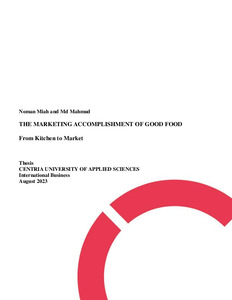The marketing accomplishment of good food : from kitchen to market
Miah, Noman; Mahmud, Md (2023)
Miah, Noman
Mahmud, Md
2023
All rights reserved. This publication is copyrighted. You may download, display and print it for Your own personal use. Commercial use is prohibited.
Julkaisun pysyvä osoite on
https://urn.fi/URN:NBN:fi:amk-2023121437470
https://urn.fi/URN:NBN:fi:amk-2023121437470
Tiivistelmä
The thesis "THE MARKETING ACCOMPLISHMENT OF GOOD FOOD: From Kitchen to Market"examines the methods and elements that go into successfully marketing food items from the kitchen to the market. The study looks at the growing need for tastier, more sustainably sourced food as well as the difficulties faced by small-scale food businesses. The study makes use of qualitative research techniques, such as in-depth interviews, participant observation, and examination of promotional materials and online forums.
For successful marketing of high-quality food, the study underlines the significance of product quality, distinctiveness, branding, packaging, and developing connections with target markets. Customers are more likely to buy from entrepreneurs who provide high-quality goods with distinctive flavours, appealing packaging, and ethical sourcing. Success also depends on creating sincere relationships with customers through targeted marketing, social media, and efficient distribution channels like internet platforms, regional market places for produce, and joint ventures with merchants. The study highlights the difficulties faced by small business owners, such as their access to resources, rivalry, and regulatory barriers. To overcome these challenges and establish items in the market, the study advises the necessity for supportive networks, such as partnerships with other small enterprises or mentorship programs.
Overall, the study helps to our understanding of the changing food sector and offers insightful information about the marketing success of high-quality food goods. The scalability and long-term viability of these marketing strategies might be investigated in more detail.
For successful marketing of high-quality food, the study underlines the significance of product quality, distinctiveness, branding, packaging, and developing connections with target markets. Customers are more likely to buy from entrepreneurs who provide high-quality goods with distinctive flavours, appealing packaging, and ethical sourcing. Success also depends on creating sincere relationships with customers through targeted marketing, social media, and efficient distribution channels like internet platforms, regional market places for produce, and joint ventures with merchants. The study highlights the difficulties faced by small business owners, such as their access to resources, rivalry, and regulatory barriers. To overcome these challenges and establish items in the market, the study advises the necessity for supportive networks, such as partnerships with other small enterprises or mentorship programs.
Overall, the study helps to our understanding of the changing food sector and offers insightful information about the marketing success of high-quality food goods. The scalability and long-term viability of these marketing strategies might be investigated in more detail.
